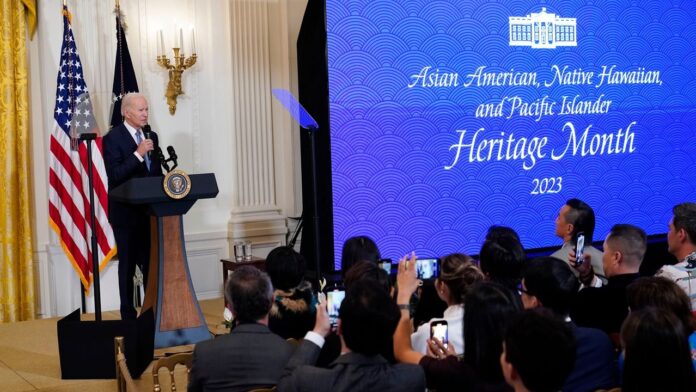WASHINGTON — Immigration is an issue that many Asian Americans, Native Hawaiians and Pacific Islanders want the government to focus on this year, but they are sharply divided on what actions President-elect Donald Trump should take when he returns to the White House, according to a new poll.
The survey released Wednesday from AAPI Data and The Associated Press-NORC Center for Public Affairs Research finds that although Trump’s favorability appears to have increased among AAPI adults since before the election, most continue to view him negatively. And there’s little consensus on one of his major immigration proposals: About 4 in 10 AAPI adults support deporting all immigrants living in the U.S. illegally, while a similar share oppose the idea and the rest are neutral.
The poll is part of an ongoing project exploring the views of Asian Americans, Native Hawaiians and Pacific Islanders, whose views are usually not highlighted in other surveys because of small sample sizes and lack of linguistic representation.
The findings come less than a week away from Trump’s inauguration. He is preparing a shock-and-awe campaign of more than 100 executive orders on border security, deportations and other policies starting on his first day in office. States’ lawmakers, depending on their political affiliation, are vowing to either support or resist Trump’s vision.
Immigration has risen as a priority for AAPI adults over the past year. The poll found that about 4 in 10 named immigration and border issues as one of the top five problems the federal government should work on in 2025, up from about 3 in 10 who said it was a priority for 2024. There has been a similar uptick in the share of U.S. adults overall who want the government to address immigration and border topics. About half of Americans want immigration to be a priority this year, while about one-third wanted it prioritized going into 2024.
Calvin Do, 38, said that supporting the deportation of people who entered the U.S. illegally doesn’t make someone “anti-immigrant.” Do, of Seattle, has lived in blue states all his life and used to be a Democrat. Over a decade ago, the Chinese and Vietnamese American switched to Libertarian and leans conservative on most policy issues. Do said he sympathizes with people wanting a better life, but he believes entering the country illegally does “a disrespect” to people like his immigrant parents.
“There’s people out there who are very talented and very smart and very good-hearted. But the point is, you didn’t do it the right way,” Do said.
One question, according to Karthick Ramakrishnan, founder and executive director of AAPI Data, is whether the focus on immigration will persist, or if AAPI adults’ priorities will shift. An AAPI Data/AP-NORC poll conducted in September found that while AAPI adults had similar views to Americans overall about immigrants in the U.S. illegally, they were more likely than the general public to see benefits from legal immigration.
“An important aspect of Asian American public opinion to watch out for in the next four years is to see if we will start seeing shifts in terms of these issue priorities and commitments,” Ramakrishnan said. “We do seem to see a shift on immigration.”
The rhetoric surrounding immigration during the presidential election may have played a role in elevating immigration as an issue, while Republican governors in Texas and Florida bussing and flying immigrants to cities in states led by Democrats may also have added to it, Ramakrishnan said.
Even now, though, immigration isn’t AAPI adults’ only priority. About three-quarters of AAPI adults want the government to prioritize the economy in 2025, similar to U.S. adults overall, and about 3 in 10 want to see action on climate change. The poll also found that about half of AAPI adults think that abortion and reproductive rights may face a “major threat” in 2025.
Nilay Patel, 32, wants the government to concentrate on inflation, climate change and reproductive rights. Living in Chicago, Patel, who is Indian American and leans Democratic, said he doesn’t feel that he’s very affected by immigration and border issues.
He doesn’t oppose deporting people who are in the country illegally, he said, but added that if mass deportations occur, it needs to happen carefully. “It needs to be tempered by like actually paying attention to what you’re doing, not just blindly like picking up every person who looks like they’re an immigrant,” Patel said.
AAPI adults are feeling a little more positive about Trump than they were before the election, the poll found, but they have mixed emotions about his return to office. Since the election, Trump’s favorability appears to have increased by about ten percentage points among AAPI adults, although about 6 in 10 still view him unfavorably. About 4 in 10 AAPI adults said “fearful” characterizes their emotions “extremely” or “very” well when thinking about Trump’s second presidency. About one-third said this about the word “angry.” Fewer AAPI adults — about 2 in 10 — said they’re “satisfied” or “excited.”
Even among AAPI Republicans, about 2 in 10 said they’re “fearful” about a second Trump term.
Do said he hasn’t noticed whether anyone in his family has become more progressive or conservative after the election because he now finds politics too difficult to discuss.
“I hate to see, like, people tearing each other apart,” Do said. “Each group has its strengths. Each group has its weaknesses. We just need to find a common ground, and that’s it.”
___
Tang reported from Sunnyvale, California.

